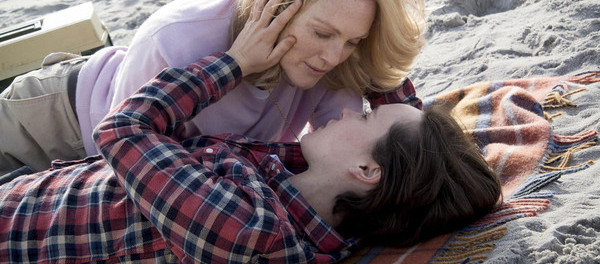Review of Freeheld: The Fight For Equality
Freeheld is based on the true story of Laurel Hester and Stacie Andree, a lesbian couple who, starting in 2005, fought a legal battle against Hester’s employer (the Ocean County, New Jersey Board of Chosen Freeholders) over the issue of transferring her pension to her same sex domestic partner. The couple’s courageous efforts proved to be monumental in relation to gay rights and same sex marriage in the U.S. Freeheld not only documents Hester and Andree’s courtroom fight for equality but also sheds light on their personal struggles against prejudice, ignorance, and discrimination.
Freeheld’s impressive cast includes Oscar winner Julianne Moore (Still Alice), as well as Oscar nominees Ellen Page (Juno), Michael Shannon (Revolutionary Road), and Steve Carrell (Foxcatcher). The film was directed by Peter Sollett and written by Ron Nyswaner. The screenplay for Freeheld was based on Cynthia Wade’s 2007 award winning documentary short of the same name. Actress Ellen Page spent several years working towards developing this project and serves as co-producer on the movie.
At the beginning of Freeheld, viewers are introduced to New Jersey detective Laurel Hester, a capable but secretive woman who, due to her professional aspirations, has chosen to hide her homosexuality from her co-workers. Things get complicated when she encounters Stacie, a rather butch and much younger lesbian. The two are instantly smitten with one another and before long, the lovers buy a house, adopt a dog, and make things legal by entering into a so-called “domestic partnership”.
The couple’s life is rocked to the core when Laurel is diagnosed with terminal lung cancer. At this point the film shifts focus and concentrates on Laurel’s battle with cancer and her fight to provide for Stacie once the disease takes her life. The dying woman is steadfast in her wish to transfer her well-earned pension benefits to Stacie, thus allowing her partner to remain in the home they shared. Despite the fact that the couple are legal domestic partners, they soon realize that this doesn’t afford them the same benefits and/or rights as a married heterosexual couple.
In some respects, Julianne Moore’s character in Freeheld is reminiscent of her role in 2014’s Still Alice. Both women start out as high functioning and successful women who, due to a serious medical condition, slowly whither away. In Freeheld, Laurel’s body is ravaged by cancer while in Still Alice, it’s the main character’s mind that wastes away because of early onset Alzheimer’s disease.
Freeheld’s only weak moments involve the film’s one dimensional depiction of its secondary characters. Throughout the movie viewers are briefly introduced to Stacie’s mother and Laurel’s sister but little to nothing is really known about them. Although these characters are depicted as having an important part in several scenes late in the film, these women lack personality and aren’t given the opportunity to stand alone as real people. The same can also be said about Steve Carrell’s character, Steven Goldstein. Although the activist describes himself as gay and Jewish, not much else is revealed about him. There’s only one brief scene in the film in which viewers get a glimpse of him at home (apparently alongside his partner) preparing dinner.
Freeeheld is an important film which tells a story that needs to be seen by mainstream audiences. It’s not a gay love story but rather a film which addresses issues relating to the struggle for equality, dignity, and basic human rights. Freeheld also demonstrates the undeniable reality which lies at the core of the drama and that is that whether heterosexual or homosexual, love is love.
Freeheld is now playing in theatres.







